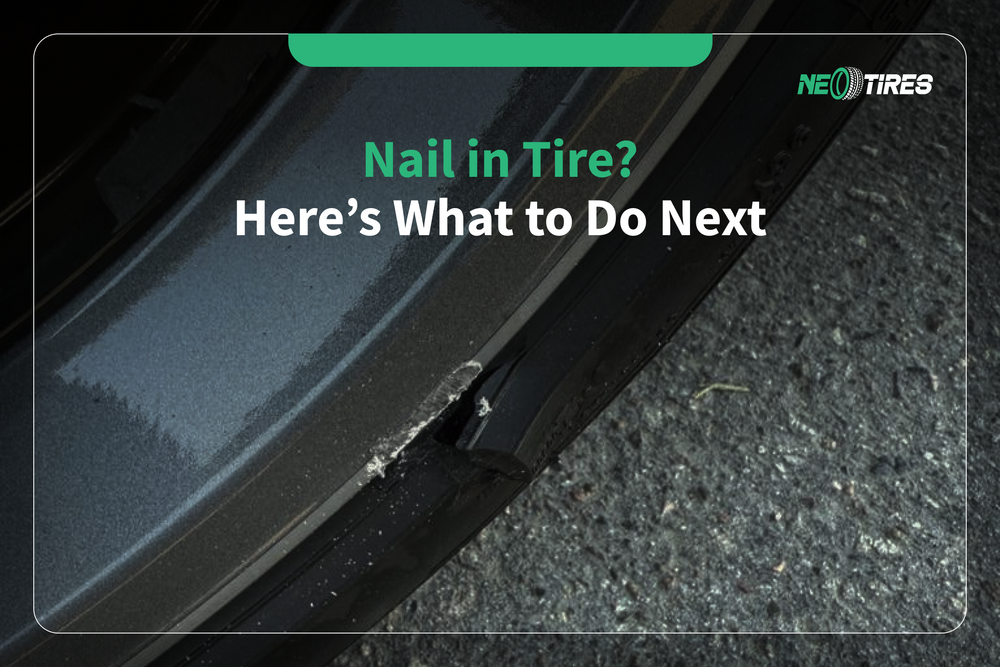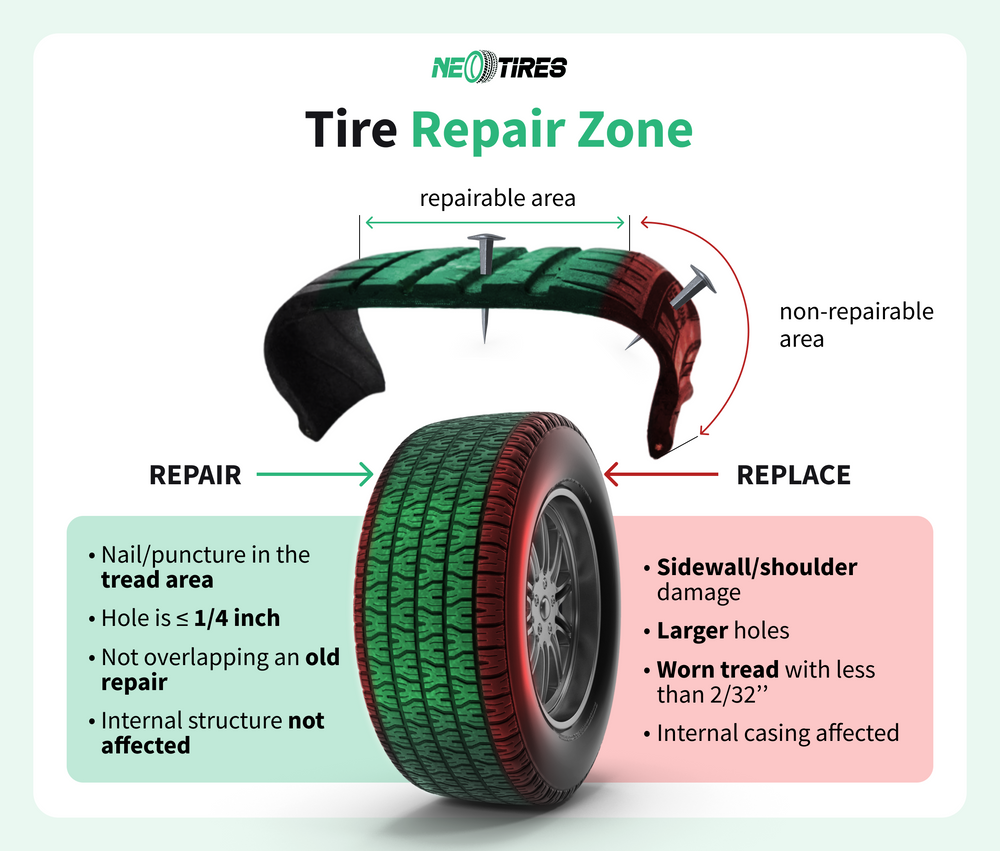Nail in Tire? Here's What to Do to Stay Safe
A nail in the tire can happen to anyone and anywhere, and is one of the most common causes of a flat. While repairing a tire with a nail or screw is possible, sometimes replacing the tire is a safer solution. This section discusses what to do when you find a nail or screw in one of your tires and the cost of patching it, as well as whether a repair is possible.
Can You Drive With a Nail in Your Tire?
In short, you can drive with a nail in your tire, but only for as short a distance as possible. If you spot a nail or screw that is still holding air and your TPMS light doesn't turn on, you can drive for a short distance to the nearest garage or service station. Yet, it's still not riskless.
Why Driving with a Nail or Screw in a Tire is Not Safe:
- The little puncture can get worse if you're still driving
- The screw or nail can fall out at any moment, causing a rapid air drop
- Potential air leakage can cause underinflation, leading to uneven wear
- Tire internal damage is possible, even if not visible to the naked eye
To sum up, driving with a punctured tire that still has air is acceptable, but only for a short time. Keep a speed of up to 50 mph if you have to drive to a safe spot for tire inspection. Driving on a flat tire after a nail puncture is completely unsafe, which is why you should use your spare tire instead or call for road assistance.
Is Nail in Tire Repair Always Possible?
Repairing a tire following a screw/nail puncture is not always possible and it depends on how significant the damage is. USTMA and TIA recommend considering clear guidelines about when fixing a tire is possible and when replacing it is safer. For example, patching a tire is generally safe when the puncture is in the tread area and the hole is not bigger than about 1/4 inch (6mm). Tire patching is also acceptable when no internal damage has been detected and the patch does not overlap an older repair.
To detect potential internal damage, removing the tire from the rim and conducting a close inspection are necessary. It is best to leave your tires in the hands of a professional to estimate the degree of internal damage, if any.
When Is Patching a Tire Safe?
| Condition | Repairable? |
|---|---|
| Hole is ≤ 1/4 inch (6mm) | Yes |
| Puncture is in the tread area | Yes |
| No sidewall or shoulder damage | Yes |
| Internal structure intact (no belts/casing damage) | Yes |
| Not overlapping an old repair | Yes |
Note that, for safety purposes, the decision to patch over replace a tire should be reserved for a professional after a thorough inspection.
Can a Nail in Run-Flat Tires Be Repaired?
Tire replacement over repair is the safest recommendation because the reinforced construction of a run-flat makes it difficult to assess secondary internal damage beyond the puncture. So, while patching or plugging a run-flat can solve the puncture issue, the underlying unspotted internal damage can further threaten the driver's safety.
We recommend that you familiarize yourself with your manufacturer's specifications. Yokohama, for example, explicitly does ot allow repair in its run flats. Pirelli advises against run-flat repair, yet it all depends on individual case. Bridgestone allows repair after a nail in limited circumstances. So, it all comes down to the manufacturer's run-flat specifications and policies, which you should study in advance.
Which Run-Flat Tire Brands Allow Repairs after a Nail?
| Tire Brand/Run-Flat Model | Repair Policy |
| Bridgestone DriveGuard Run Flat | ✅ Repairable in limited circumstances |
| Michelin ZP (Zero Pressure) | ✅ Repairable only once by a professional under the same conditions and following the same inspection and repair procedure as non-ZP tires |
| Continental SSR | ✅ Repairable strictly upon thorough inspection carried out by a qualified tyre professional. ❌ non-repairable if signs that the tire has been used in an underinflated condition are present |
| Pirelli Run Flat™ | ❌ Generally against repair, but it all depends on the individual case. Qualified inspection at a professional service centre is advisable |
| Goodyear RunOnFlat | ✅ Repairable once in tire lifetime with a qualified tire professional following a thorough inspection. All repair work is the responsibility of the tire professional. |
| Dunlop DSST | ✅ Repairable under specific conditions. A qualified tire professional should make the decision to repair run-flat tires |
| Yokohama ZPS | ❌ No repairable following a puncture or other tire disablement |
| Hankook Runflat | ✅ Repairable in the same manner as standard tire versions, under specific conditions |
When to Replace a Tire with a Nail/Screw in It?
While a tire after a puncture is, in most cases, easy to manage by patching, replacement is a safer choice when:
- Screw/nail affects tire shoulder or sidewall (non-repairable zones)
- The hole in the tread is larger than 1/4 inch
- The tread is shallow with a depth less than 2/32'' (tire replacement is recommended with or without a nail in it)
- Steel belts or other internal damage are present
- Multiple punctures are too close to each other
- The tire has already been repaired previously
These premises compromise tire integrity, making it vulnerable to air loss and subsequent damage. Tire replacement is a wise decision to ensure strength and resistance at speed and in unstable road conditions.
Should You Remove the Nail From the Tire?
You should not remove the object, as it blocks major air leakage and temporarily seals the tread by holding the air inside. At the same time, try to drive as short a distance as possible to a repair station for patching, so that the nail or screw does not rub against the tire walls and make the hole bigger. You can remove the screw if you have the necessary tools at hand for an immediate plug or patch.
What to Do Once You Discover a Tire Nail
Once you notice a screw or nail in the tread, don't pull it out, even if it seems tempting. Check air levels to ensure the pressure is optimum to keep driving safely, and monitor your TPMS light. Don't wait until the light turns on and drive to a repair station at a speed no faster than 50 mph. Mount your spare tire if the pressure drops low, or adjust the pressure with a portable inflator until you reach the technical center.
Tire Repair Options: Plug vs. Patch vs. Plug-Patch
Three of the most common tire repair methods after a nail are plugs, patches, and plug-patch combos. While each effectively resolves puncture-related issues, the plug-patch combos are the strongest and safest.
| Option | How it works | Pros | Cons |
| Plug | Inserted into hole from outside without tire removal | Fast and cheap | Not suitable for angled holes |
| Patch | Adhesive patch applied inside tire after removal | More durable than plug | Requires tire removal |
| Plug-Patch Combo | Best-practice repair using both methods | Strongest and safest | Slightly higher cost and labor |
How Much Does a Tire Patch Cost?
The tire patching cost depends on the repair method (patch/plug/combo) and where you go for service. It usually ranges between $10 and $50 at a service station and about $40 and $70 for at-home or roadside assistance. Many national chains, such as Discount Tire or American Tire Depot, provide free tire repair services with or without road hazard coverage. Here's an approximate tire patch price breakdown:
| Repair Service | Approximate cost per tire |
| Plug only | $10 – $20 |
| Patch only | $15 – $30 |
| Plug-patch combo | $20 – $50 |
| Mobile service repair (At-home or roadside assistance) | $40 – $70 |
Nail in Tire? Inspect and Fix It Right
Finding a nail in your tire should not panic you too much, as it is easily manageable with the right tools and actions. Double check your tire condition after a screw or nail with a professional for your peace of mind and confident driving.
Irreparable Tire? NeoTires Puts You Back on the Road
If your tire cannot be repaired or if you want peace of mind even after a minor puncture, NeoTires is a reliable source for replacement tires. Competitive prices, advantageous deals, fast shipping to your doorstep, and professional advice are only part of what our team can offer you.
Explore our wide tire selection for any needs or
Reach out to us for assistance with any tire-related matter
We keep you rolling smoothly and affordably. Drive safe and choose your tires wisely!






